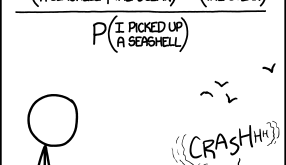from Dean Baker With the United States data we have seen from the last few months, it’s fair to say that no one has a very good idea of where the economy is. At the most basic level, we have seen seven months of incredibly rapid job creation this year; the economy added 3.3 million jobs through July, along with two consecutive quarters of negative growth. We don’t have to join the Trumpers in calling this a recession, to be bothered by seeing two main economic indicators going in...
Read More »Econometrics — the danger of calling your pet cat dog
from Lars Syll The assumption of additivity and linearity means that the outcome variable is, in reality, linearly related to any predictors … and that if you have several predictors then their combined effect is best described by adding their effects together … This assumption is the most important because if it is not true then even if all other assumptions are met, your model is invalid because you have described it incorrectly. It’s a bit like calling your pet cat a dog: you can try...
Read More »Say it ain’t so
from Peter Radford re-visiting economics’ basic concepts I am nothing if not annoying. Allow me to elaborate. Let’s be basic. I mean really really basic. Our model world initially consists of two people, Adam and Eve. I know, it’s been done before. But we are economists. What are we interested in? What problems that Adam and Eve face do we want to study? Well, they need energy. Human bodies, like all ordered structures, need flows of energy to maintain that structure. The Second...
Read More »Jürgen Habermas and Hans Albert on the weaknesses of mainstream economics
from Lars Syll The weaknesses of social-scientific normativism are obvious. The basic assumptions refer to idealized action under pure maxims; no empirically substantive lawlike hypotheses can be derived from them. Either it is a question of analytic statements recast in deductive form or the conditions under which the hypotheses derived could be definitively falsified are excluded under ceteris paribus stipulations. Despite their reference to reality, the laws stated by pure economics...
Read More »Markets are only a sub-set of economic life
from Ken Zimmerman (originally a comment) Economic life is the activities through which people produce, circulate and consume things, the ways that people and societies secure their subsistence or provision themselves. Activities by which communities sustain themselves. ‘[T]hings’ is, however, an expansive term. It includes material objects, but also the immaterial: labor, services, knowledge and myth, poems, religion, names and charms, and so on. In different times and places, different...
Read More »Dumb and Dumber — the Chicago economics version
from Lars Syll Some years ago, in a lecture on the US recession, Robert Lucas gave an outline of what the New Classical school of macroeconomics today thinks on the latest downturns in the US economy and its future prospects. Lucas shows that real US GDP has grown at an average yearly rate of 3 per cent since 1870, with one big dip during the Depression of the 1930s and a big — but more minor — dip in the recent recession. After stating his view that the US recession that started in 2008...
Read More »A coherent alternative has to be proposed
from Nikolaos Karagiannis and Issue 94 RWER The practical use of the term “neoliberal” exploded in the 1990s, when it became closely associated with two developments. One of these was financial deregulation, which would culminate in the 2008 financial crash and in the still-lingering euro debacle. The second was economic hyper-globalization, which accelerated thanks to free flows of finance and to new, more ambitious types of trade agreements. Financialization and hyper-globalization have...
Read More »Yanis Varoufakis on the irrelevance of mainstream economics
from Lars Syll [embedded content] Varoufakis is undoubtedly right — there is indeed something about the way mainstream economists construct their models that obviously doesn’t sit right. One might have hoped that humbled by the manifest failure of its theoretical pretences during the latest economic-financial crises, the one-sided, almost religious, insistence on axiomatic-deductivist modelling as the only scientific activity worthy of pursuing in economics would give way to...
Read More »Machine age musings on algorithmic growth theory
from Peter Radford Don’t mind me. I am just thinking out aloud… That we live in a Machine Age is indisputable. Our lifestyles depend entirely upon the mediation of machines. Without them modernity collapses back to whatever existed in the prior ages and we surrender most of what we currently cherish. And it is important to use the phrase “machine age” because other phrases such as Industrial Age and so on limit us. Some say we are now entering a Digital Age, but this too is a...
Read More »Frank Ramsey — a portrait and a critique
from Lars Syll Mainstream economics nowadays usually assumes that agents that have to make choices under conditions of uncertainty behave according to Bayesian rules, axiomatized by Ramsey (1931) and Savage (1954) — that is, they maximize expected utility with respect to some subjective probability measure that is continually updated according to Bayes theorem. If not, they are supposed to be irrational, and ultimately — via some “Dutch book” or “money pump” argument — susceptible to...
Read More » Real-World Economics Review
Real-World Economics Review




